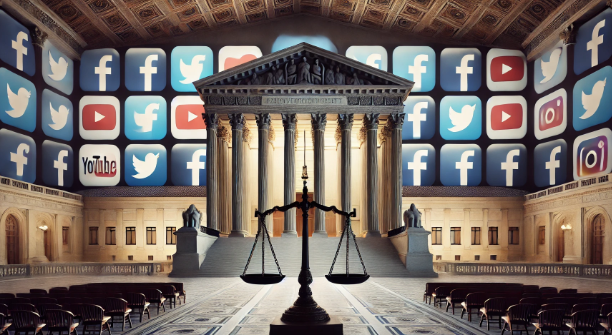The U.S. Supreme Court has temporarily postponed a decision on whether social media laws in Florida and Texas violate the First Amendment. The justices unanimously decided to send the cases back to lower courts to evaluate how the laws apply in specific situations. Justice Elena Kagan stated that the previous rulings focused too broadly on free-speech principles without considering the laws’ specific applications.
- Supreme Court Defers Ruling: The U.S. Supreme Court has delayed a decision on whether Florida and Texas social media laws violate the First Amendment, instead sending the cases back to lower courts to focus on the laws’ specific applications.
- Laws Target Perceived Bias: The Florida and Texas laws aim to prevent “Big Tech” from allegedly censoring conservative views, allowing lawsuits and prohibiting discrimination against specific viewpoints on large platforms.
- Broader Free Speech Implications: Social media companies like Facebook and YouTube are concerned about state interference with their content moderation policies, arguing it infringes on their own free speech rights.
- Ongoing Legal Challenges: This case adds to a growing list of state and federal battles over digital free speech, including cases against the Biden administration and California’s data protection laws for minors.
Various news sources have reported that the laws in question were enacted after complaints that former President Donald Trump faced discrimination or unfair blocking on social media. In 2021, Florida Governor Ron DeSantis signed a law targeting “Big Tech censors” for perceived bias against conservative viewpoints. The law applies to social media sites with significant revenue or user bases and allows lawsuits for “unfair censorship.” Texas Governor Greg Abbott signed a similar law, stating that “conservative speech” was under threat. This law prohibits social media platforms with over 50 million U.S. users from discriminating against users based on their viewpoints.
NetChoice and the Computer & Communications Industry Association challenged both laws, arguing they infringe on free speech. The Supreme Court previously put these laws on hold with a 5-4 order. The current decision leaves unresolved whether states can influence what appears on major social media platforms. Social media companies like Facebook, YouTube, and Instagram could face penalties if found to censor conservative content.
The debate over social media regulation continues to grow across the United States. Recently, the court dismissed a lawsuit from Republican state attorneys accusing the Biden administration of censoring social media. The administration stated it only alerted platforms about disinformation related to vaccines and COVID-19. Justice Amy Coney Barrett noted that there was no evidence of government pressure on social media companies to remove content.
In California, a federal judge blocked a law prohibiting online companies from collecting and selling data on minors, citing First Amendment concerns. These cases highlight the ongoing tension between state legislation and constitutional rights concerning digital platforms.
The Supreme Court’s decision underscores the complexity of balancing free speech with state-level regulations in the digital age. As these cases return to lower courts, the outcome will likely shape the future of social media governance in the United States.

